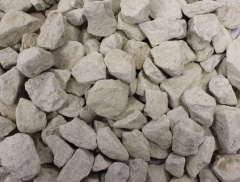Limestone
| Infobox on Limestone | |
|---|---|
| Example of Limestone |  |
| Facts | |
| Origin | - |
| Stowage factor (in m3/t) | 0,67/0,84 m3/t (bulk) |
| Humidity / moisture | Up to 4% |
| Ventilation | No special requirements |
| Risk factors | - |
Limestone
Description
Limestone (See also Marble and Dolomite)
Limestone is a sedimentary rock composed largely of the minerals calcite and aragonite, which are different crystal forms of calcium carbonate. Limestone varies in colour from cream through whiote to medium dark grey (when freshly broken).
Like most other sedimentary rocks, limestone is composed of grains; however, most grains in limestone are skeletal fragments of marine organisms such as coral or foraminifera. Other carbonate grains comprising limestones are ooids, peloids, intraclasts, and extraclasts. Some limestones do not consist of grains at all, and are formed completely by the chemical precipitation of calcite or aragonite, i.e. travertine.
The solubility of limestone in water and weak acid solutions leads to karst landscapes. Regions overlying limestone bedrock tend to have fewer visible groundwater sources (ponds and streams), as surface water easily drains downward through joints in the limestone. While draining, water and organic acid from the soil slowly (over thousands or millions of years) enlarges these cracks, dissolving the calcium carbonate and carrying it away in solution. Most cave systems are through limestone bedrock.
Limestone often contains variable amounts of silica in the form of chert (chalcedony, flint, jasper, etc.) or siliceous skeletal fragment (sponge spicules, diatoms, radiolarians), and varying amounts of clay, silt and sand (terrestrial detritus) carried in by rivers.
Application
Building stone, metallurgy (flux), manufacture of lime, source of carbon dioxide, agriculture, road ballast, cement (Portland and natural), alkali manufacture, removal of sulfur dioxide from stack gases and sulfur from coal.
Shipment / Storage / Risk factors
For overseas transport advice, consult the IMSBC Code (International Maritime Solid Bulk Cargoes Code) and applicable MSDS sheet.











